Okinawa Blues

Since 2010 I have traveled to Okinawa just about every year. Usually I have gone with my friend Ed Alvarez. We first travelled to Okinawa together in 2012 to present at a number of conferences focusing on issues of demilitarization, indigenous rights and also decolonization. Ed was the Executive Director of the Guam Commission on Decolonization and had made some important connections to academics and protest groups. One of my goals at some point is to write an academic article about the ever-evolving conversation in Okinawa about decolonization and political status. It is fascinating and often goes far beneath the radar, as most focus on the demilitarization and anti US base protests. But since I have been traveling there, I have regularly heard the makings of a decolonization conversation. When I say this, I don't mean it looks the same or sounds the same, or takes the same shape as Guam's. I mean that for Okinawa, which faces a number of fundamental and structural issues ab




